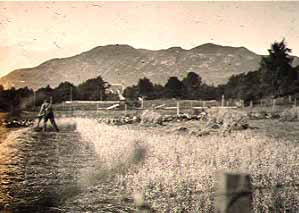History
Post-war depopulation

Not only did the two world wars decimate the male population, but the lack of employment opportunities afterwards gave impetus to the gravitation of the younger inhabitants to leave the village and seek work in the bigger centres of population.
Following a long tradition of Highlands and Islands men, many enrolled in the Police forces of the larger towns and cities – indeed, the Shinty team of Glasgow Police, drawn almost entirely from ex-patriate Highlanders still survives today, although a much lesser force in the game than it was at that time. Mining and steel working were also a source of employment, though these industries were soon to show signs of recession. Car building and the burgeoning light industries also gave further hope.
During this time of de-population, whilst the housing market in the more prosperous parts of England and Scotland was buoyant, here in the Highlands many properties became empty, and some fell into disrepair, leading to a wide disparity in house prices and the growth of the ‘holiday home’ on a new and different scale from that of Edwardian days. Where in those days the wealthy gentry came and built large houses, bringing with them employment – albeit part time or lowly paid ‘below stairs’, after the war it became the fashion of the simply ‘comfortably off’ to buy a wee ‘hame in the heilands’ and ‘do it up’. To be fair, many of these holiday homes went on to be let to the growing self catering market, bringing new visitors to the area.
Continuing efforts to create local employment are helping to slow the movement of young men and women from the area, though it is still continuing today.